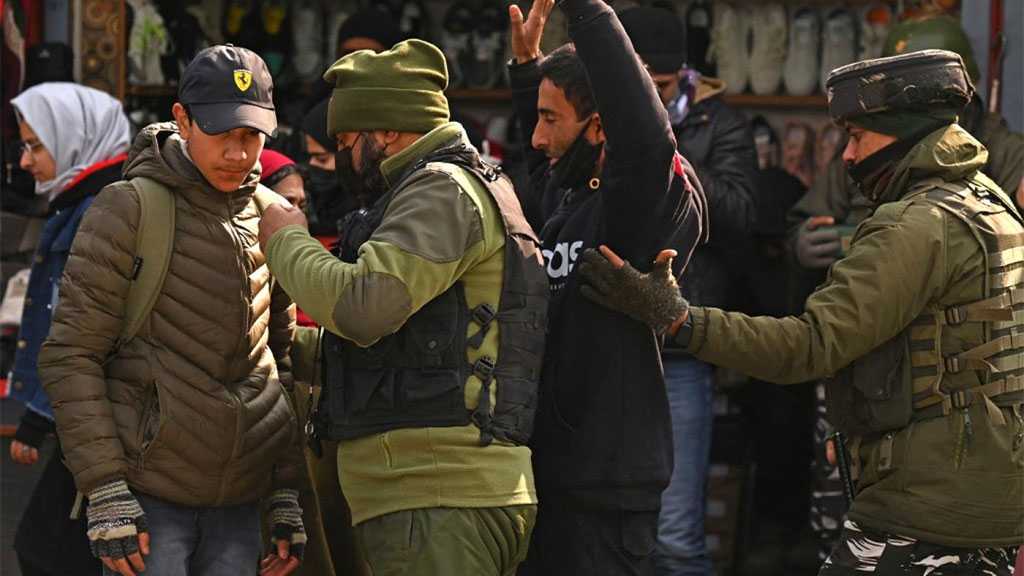
In Kashmir, Indian Bulldozers Are Now Carrying Out Settler-colonial Policy

By MEE
Bricks are falling amid a cloud of dust onto the snow-covered roads. Wailing can be heard in the background. Bulldozers are moving in, aiming to bury a long struggle for freedom. The scenes might be akin to the ‘Israeli’ demolition of Palestinian homes, but this time we are witnessing India's settler-colonial policy in Kashmir.
Videos emerge from Kashmir each day, showing bulldozers ploughing through residential and non-residential areas, demolishing structures that the administration claim to have been built illegally by encroaching on "state land."
Each day brings new stories about how much land has been "reclaimed" by the state.
India's continual anxiety over the Kashmiris' collective power and demands for the right to self-determination expresses itself through such demolitions.
Even the properties of pro-India politicians, who have carried out the writ of the Indian state in Kashmir, are being demolished, with the claim of coming down hard on the rich and the powerful.
This also enables narrative building around how this destruction is not directed at the poor and the honest but targets the rich and corrupt, to create an acceptance for such actions.
Over the past three decades of Kashmir's armed resistance to India's control, homes have often been destroyed as part of the counter-insurgency tactics of the Indian state when engaged in gunfights against pro-freedom militants.
Homes have been set on fire using flamethrowers and entire neighborhoods ransacked as collective punishment meted out to the people for their resistance to militarized control.
Precarious lives
In recent years, properties belonging to political dissidents, militants, political organizations such as the All Parties Hurriyat Conference and religious-political groups such as the now-banned Jamaat-e-Islami - and of individuals affiliated to it - have been sealed off and taken control of by the state in the name of combating terror.
A recent order has also banned the sale of agricultural land belonging to "missing persons," with the administration directing that such persons be presumed dead. It is important to note that Kashmir's missing persons primarily include thousands of men subjected to enforced disappearance by the Indian state.
Their families have wandered from jails to torture centers to find any trace of their kin. As if that uncertainty itself wasn't enough of a struggle, now these families will find the property belonging to their disappeared kin earmarked, with no rights to sell it and no revenue documents issued for such land.
This destruction of homes, in addition to the killings, torture and multiple other forms of violence that have been well documented, is part of a policy designed to break the will of the people.
The vision of Kashmir as an integral part of India means such policies are seen as a legitimate way to secure the territory. India seeks to reorganize Kashmiri ownership of their own land and dismantle structures of Kashmiri resistance.
This policy is now witnessing the widespread use of bulldozers to perform the act of "spacio-cide" for the state, in that people's spaces and properties are being taken control of or destroyed by the Indian state to make it uninhabitable for Kashmiris and render their lives even more precarious.
Also, by calling this "state land," India is making the transfer of this property from Kashmiris to India, and by extension to its imperialist-capitalist agents, easy and inevitable.
Habitational violence
When a retired Indian army general was asked by a journalist whether it was ever considered how demolishing houses affected the civilian population and shaped its perception of the Indian state, the general answered "No," and accused the affected homeowners of being "complicit" for giving shelter to militants. "Where is the question of outrage?" he asked. "You are complicit."
This habitational violence, as Kate Siegfried argued in the context of Palestine, is one where people's domestic spaces are destroyed under the guise of illegality to eventually erase the locals' land claims and make way for the settler society.
The claim of "state land" is riddled with multiple problems in terms of how what belongs to the commons comes to be expropriated over the years and the state finds new categories for dispossession and eviction.
This dispossession is an ongoing story, one that is absent from most mainstream media outlets, focused as they are on India's growth trajectory.
Given such "growth" builds on decades of military occupation of Kashmir, it is perhaps not surprising that the media largely avoid the issue, as they do the dehumanization of India's Muslim minority and other marginalized groups.
Kashmiri homes have always been a site of war under India's military occupation. Imagine sitting in your house with your family, having an intimate conversation, and suddenly finding armed soldiers surrounding the house and demanding entry or just simply breaking in, beating, killing, ransacking.
Imagine the home you put together with blood and sweat being brought down, brick by brick, reduced to a pile of concrete rubble. What does that do to the sense of safety and security that the idea of home is supposed to provide?
That is the reality of home for many Kashmiris, as they struggle endlessly to define and protect what is theirs.
Comments



